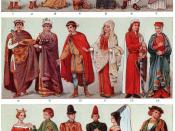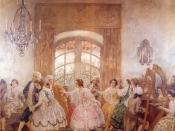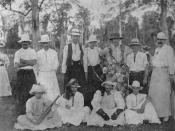How Does Hartley suggest the differences between social classes in the Go-Between? L.P Hartley's 'The Go-Between' is a novel in which class distinction plays a major part. Many of the events that occur within the course of the novel demonstrate these distinctions and the way in which society's perceptions and the class structure govern the actions of Hartley's characters. Hartley does not merely suggest class differences, but goes as far as to make explicit allusions to the rigid social structure of the period.
Hartley uses the social metamorphosis of his protagonist, Leo Colston, as a vehicle for expressing the power of the class structure over society's actions. References to the subject of class range from the evident, such as differences in clothing, to the more complex sub-textual elements of the interaction between characters. One example of a situation in which the distinction between the classes is made particularly clear can be seen in the cricket match and another in the relationship between Marian and Ted.
The most striking feature of the cricket match is the difference between the clothing of the participants. The villagers wear either their working clothes or some just take off their coats and play in their normal clothes. Meanwhile the members of the Hall team are respectably attired, in their cricket whites and with appropriate equipment. Leo likens this difference to the Boer War, "The village team were like the Boers, who did not have much in the ways of equipment by our standards, but could give a good account of themselves," (page 117) (The Boers were an army with no uniform).
There is also a difference between their styles of play. The village team is prepared to hit the ball with no real style, just with power. An example of this is shown in the innings of Ted Burgess, when he is at the crease as soon as a ball comes close to him, he thumps it away. The Hall team play with a sense of decorum, they play the correct strokes and look great. An example of this is shown in the innings of Lord Trimingham.
Not only is there a contest going on between the hall and the villagers, but there also seemed to be some rivalry between Ted Burgess and Lord Trimingham. They both seem to be trying to impress Marian but are equal until Leo catches out Ted. This is ironic because Leo's catch ruins Ted's chance to make a big impact on Marian and how later on it is Leo who ruins the relationship between Marian and Ted. "Yet I kept my sense of the general drama of the match and it was sharpened by an awareness, which I couldn't explain to myself, of a particular drama between the bowler and the batsman. Tenant and landlord, commoner and peer, village and hall - these were the elements in it. But there was something else, something to do with Marian, sitting on the pavilion steps watching us." (Page 126-7) Also the hall team consists of gentlemen and the servants this meant the servants of the hall team are playing against their equals in the village team.
In the party after cricket match there is a shift in circumstances. Previously, all the different classes were split up, but are now mixed up and sitting together. Leo feels that the villagers don't look correct wearing suits, but the members from the hall look normal wearing their posh suits. " The more clothes he (Ted) put on, the less he looked like himself. Whereas Lord Trimingham's clothes always seemed to be a part of him. Ted's fine feathers made him look a yokel. (Page 131) Marcus thinks the villagers' smell, simply because they are in a lower class than him. " We've said goodbye to the village for a year. Did you notice the stink in that hall" (page 139) Marcus and his mother Mrs Maudsley hate the idea of sitting next to the villagers. Those two sentences sum up their attitude towards the villagers. "I was sitting with Mama pretending to be a villager - poor dear, she didn't want them on both sides of her - and she was convulsed, and so was I - I shouldn't like to tell you what I nearly did." Marcus thinks of the villagers as common and dirty, and neither he nor his mother wish to be seen in front of their friends sitting with people in a lower class than them.
There is also a difference in their housing. Although the Maudsleys might exude an air of wealth, they are simply tenants at Brandham Hall, which is owned by Lord Trimingham. The hall is one of the best houses in the area so the Maudsleys want to live there to rectify their social status.
Leo and his mother live in Court Place. His father used to live in the house as well but he died while Leo was young. The name of the house is perceived as being upper class and it is the primary reason that Leo ends up going to Brandham Hall. Marcus assumes that Leo is rich because of the name of his house and thinks it would be suitable for Leo to come and stay at his house and that he might become a good friend. "One of these confidences was our respective addresses; he told me his home was called Brandham Hall and I told him mine was called Court Place, and of the two he was more impressed, for he was, as I afterwards discovered, a snob, which I had not begun to be, except in the world of the Heavenly Bodies - there, I was a super - snob." Marcus is impressed because the name sounds palatial but it is really just a normal house.
There is also a difference in their clothing. Leo arrives in winter clothes because he had been ill during the previous summer and doesn't have any clothes for the summer. Leo asks whether he should wear his cricket togs from school and Marcus replies " I wouldn't if I were you. Only cads wear their school clothes in the holidays. It isn't done." This shows how Leo has to change while he is around Marcus, in order to observe the customs of the upper classes. He soon learns as Marcus continues to give him lessons on the way he should act when in polite company and what to wear. For example, "Leo another thing you shouldn't do. When you undress you wrap your clothes up and put them on the chair. Well you mustn't. You must leave them lying wherever they happen to fall - the servants will pick them up - that's what they're for." When Leo and Marcus are wearing hats Leo is wearing his school band round his hat and Marcus says, " You oughtn't really to be wearing the band round your hat" in a snobbish tone. Hartley uses Marcus' opinions as a commentary on the rigorous and restricting code of conduct that the upper classes are subject to.
Later on someone asks Leo whether he has any summer clothes to wear but defending himself he says he isn't hot. Marian comes to his rescue by offering to take him to Norwich to buy a summer suit, but the real reason she wants to go is to see Ted. The money doesn't matter to Marian. As long as he wears the appropriate clothes, they even go to an expensive shop "Challow and Crawshay," Denys comments on this shop by saying "They're much the best" He only says this because Lord Trimingham goes there to buy his ties and because Denys is a snob. When Leo goes to Norwich he comments on how he has never been to a hotel. "We lunched at the Maid's Head in Wensum Street, and this was a great occasion for me, for even when my father was alive it was a great extravagance to go to a hotel: if we went out for a meal it was always to a restaurant." This was a special occasion for Leo but the Maudsleys always went to a hotel for meals.
Viscount Trimingham is undoubtedly the richest person in the story. He is an aristocrat and puts people at ease who have less money than he does. An example is shown on page 231 where no one seems to like Leo's tie but when Trimingham tries it on and it looks good on him it makes Leo feel better. "When suddenly Lord Trimingham said, stretching his hand across the table 'Can I have a look at it? I think it's most charming'" This made Leo feel so much better about it and he kept that tie for years.
The Maudsleys are what we would call 'Nouveau Riche'. They have a good title in their last name and by making Marian marry Trimingham, they would be perfect, they would have the title and the money.
Leo and his mother are middle to lower class. They have an ordinary home and Leo is so amazed by Brandham Hall because of his ordinary upbringing. Ted is a tenant farmer on Trimingham's land. He led an ordinary life like Leo's before he came to the hall. Now that he is at the hall he is classed as a villager.
The French that Marcus and Leo use in the book also indicates money. The only reason Leo and Marcus are at the same school is because Leo is on a scholarship. Marcus is better at French than Leo is because he has a French governess. "French was one if the few subjects which Marcus was better than I was, He had had a French governess who had given him a good accent; he had also, unlike me, been abroad and there picked up words and phrases." Marian and Ted have had a secret relationship for quite a while now, but they can't marry because of their different social classes. As a villager points out at the party "If it wasn't for the difference, what a handsome pair they'd make" This could have been true as in the epilogue Marian says that she really loved Ted. " Our love was a beautiful thing, wasn't it? I mean, we gave up everything for each other. We didn't have a thought except for each other." This shows the real love they had for each other which sometimes you weren't sure about and thought it might just be a sexual relationship. They had to keep their relationship a secret because of their difference in classes, because Marian is in a rich family she knows what is expected of her, that she should marry a suitable man.
In conclusion I have shown that Hartley uses many different ways to suggest the differences between social classes, illustrating this with several situations in which the two extremes of the class spectrum, the working class and the gentry, are juxtaposed. Examples of this can be found in both the cricket match and the party afterwards. Hartley also shows the different attitudes of the classes towards money, housing, and clothes in order to illustrate the differences between their beliefs. The most telling distinction, in my opinion, is the relationship between Marian and Ted. All of the other factors illustrate the class difference but their relationship shows that despite their differences they can still be together.





